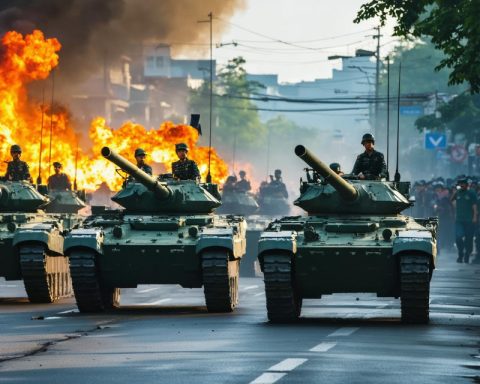- NATO allies express urgent concerns over exclusion from U.S.-Russia peace talks on Ukraine, highlighting diplomatic tensions.
- European leaders, including the UK’s Defense Secretary and Germany’s Defense Minister, emphasize the necessity of Ukraine’s participation in negotiations.
- Defense Secretary Pete Hegseth denies claims of U.S. betrayal, affirming support for Ukraine amidst rumors of talks between Trump and Putin.
- Germany’s Boris Pistorius stresses Europe’s need to be involved in peace outcomes affecting its future and security.
- Key takeaway: Peace negotiations must involve those most affected, underscoring the interconnected nature of global diplomacy.
Amid a storm of diplomatic tension, NATO allies voiced urgent concerns over being sidelined as the U.S. gears up for direct peace talks with Russia regarding Ukraine. This bold move, potentially excluding vital European allies and Ukraine itself, has rattled the continent’s political landscape.
Outside the bustling halls of NATO headquarters in Brussels, European leaders, like the UK’s Defense Secretary and Germany’s Defense Minister, stood firm in their message: Europe must not be a mere bystander. With resolute determination, they emphasized the indispensability of Ukraine’s participation in any negotiation about its future, echoing sentiments that reverberated across the meeting room.
As winter’s chill crept into Brussels, Defense Secretary Pete Hegseth found himself at the center of a diplomatic storm. Refuting claims of betrayal, he insisted that the U.S. remained steadfast in its support for Ukraine. However, as murmurs of upcoming talks between former President Trump and Russian President Putin grew louder, European leaders grew increasingly uneasy.
Germany’s Boris Pistorius painted a vivid picture of Europe standing directly under the shadow of any peace outcomes. His words resonated with a sense of urgency: Europe, he warned, must be intricately involved in shaping the peace order that will determine its own future.
This unfolding drama shines a spotlight on a crucial takeaway: In an interconnected world, peace negotiations cannot occur in isolation of those most affected. As leaders nurse their hopes for stability, the complex dance of diplomacy continues, revealing the fragile nature of international alliances and aspirations for lasting peace in Ukraine.
NATO Allies Demand Inclusion in Critical US-Russia Peace Talks
How-To Steps & Life Hacks for Navigating Diplomatic Tensions
1. Close Communication Channels: Establish secure, direct lines of communication among all stakeholders to ensure transparency and coherence in objectives.
2. Leverage Multilateral Platforms: Use established forums like the United Nations or the OSCE to facilitate broader involvement in peace discussions.
3. Public Engagement: Engage the public in Europe and Ukraine through media and public statements to maintain transparency and counter misinformation.
4. Collective Bargaining: Harness collective bargaining power by uniting European nations under a common strategy and set of priorities.
Real-World Use Cases
– European Union Cohesion: The EU can use this diplomatic situation to strengthen internal cohesion by presenting a united front.
– Resource Allocation: Nations affected by potential disarray can begin strategizing resource allocation for humanitarian aid or potential refugee situations.
– Defense Strategy Pivot: Countries may need to re-evaluate and potentially redistribute defense resources in reaction to major shifts in international alliances.
Market Forecasts & Industry Trends
Industry experts predict a potential increase in defense spending if the geopolitical climate remains unstable. As highlighted by Forbes, global defense expenditures have been rising, and tensions like these could exacerbate this trend. Additionally, the energy sector, especially natural gas, could see increased volatility in pricing due to European dependence on Russian energy supplies.
Reviews & Comparisons
In comparing NATO’s current strategy with past conflicts, such as the Cold War era, NATO shows a more dynamic role in collective security but still faces challenges in unified strategic implementation. Insights from the Atlantic Council suggest a need for an evolved, adaptive framework in NATO operations to address contemporary geopolitics effectively.
Controversies & Limitations
One major controversy involves the U.S.’s alleged exclusion of key parties in preliminary discussions. Critics, like those from the European Council on Foreign Relations, argue that bypassing direct stakeholders like Ukraine not only undermines trust but also risks long-term peace and stability in the region.
Features, Specs & Pricing
While there are no direct “features and pricing” in diplomacy, the “cost” can be viewed in terms of economic investments and military resource allocations required for sustained peacekeeping efforts.
Security & Sustainability
Security measures need to focus on cybersecurity to prevent data leaks or espionage, which have previously compromised peace negotiations. Continued investments in sustainable energy could decrease European dependency on Russian energy resources, thus stabilizing the geopolitical stance in the long run.
Insights & Predictions
Political analysts foresee a rocky road ahead if NATO fails to unify its strategy and involve all necessary participants in the peace process. Diplomatic relations and cold fronts during discussions could lead to fragmented policies that fail to address the root causes of conflict.
Tutorials & Compatibility
For diplomats and international relations students:
1. Master International Law: Understanding the frameworks governing international diplomacy is crucial.
2. Conflict Resolution Skills: Develop skills in negotiation and mediation.
3. Cultural Competency: Enhance understanding of cultural nuances that influence diplomatic behavior.
Pros & Cons Overview
Pros
– Can lead to quicker resolutions if discussions are streamlined.
– Opportunity for European nations to reassert influence.
Cons
– Exclusion of key stakeholders like Ukraine could lead to regional destabilization.
– Creates potential rifts within NATO alliances.
Actionable Recommendations
1. Advocate for Inclusivity in Talks: Ensure that negotiations include all impacted nations.
2. Strengthen Alliances: Use this as an opportune moment to reinforce NATO solidarity.
3. Prepare for Contingencies: European nations should prepare for possible outcomes, including increased refugee flows or economic sanctions.
Learn more about NATO’s role and activities: NATO
In conclusion, while the geopolitical landscape remains complex, strategic measures, a commitment to inclusivity, and proactive engagement can minimize risks and contribute towards a more comprehensive peace process.












